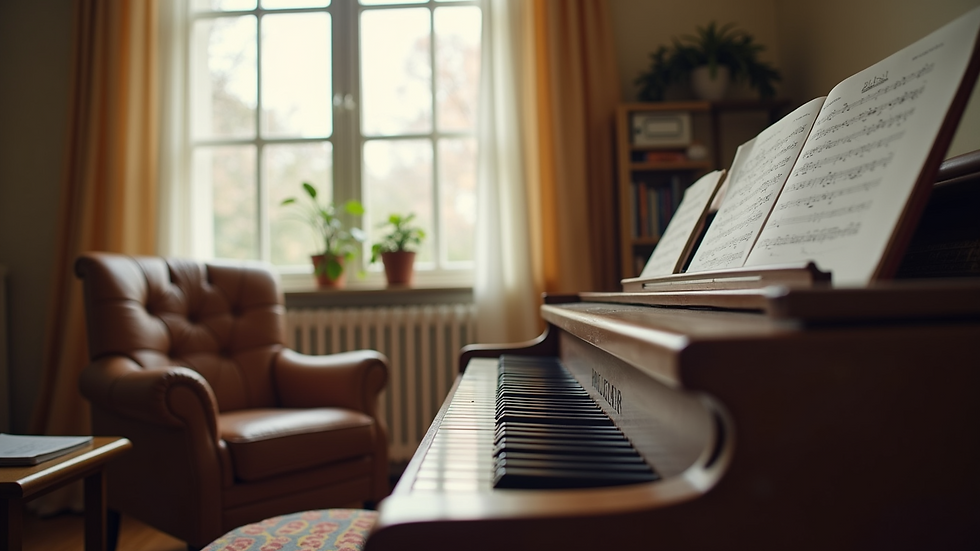Finding Time for Music as an Adult Learner
- Carlisio Keys
- Jun 11, 2025
- 4 min read
As adults, we often find ourselves wrapped up in the chaos of work, family, and various obligations. Amidst this whirlwind, the idea of engaging in music might seem like a distant dream. However, learning to play the piano is not only a fulfilling endeavor, but it can also enhance our overall well-being. Fortunately, finding time for music as an adult learner is achievable with some planning and dedication.
Discovering Your Passion for Piano Lessons
The journey of learning to play the piano can be incredibly rewarding. It offers a creative outlet and a means to unwind after a long day. Whether you are revisiting a childhood passion or starting anew, adult piano lessons can fit into your busy schedule with enough determination.
Time management is essential for adult learners, especially those juggling careers and family. A common misconception is that learning an instrument requires hours of practice every day. However, it is important to recognize that just a few minutes each day can lead to significant improvement over time. Setting aside 20-30 minutes a day can allow you to practice consistently without feeling overwhelmed.

Balancing Responsibilities with Piano Learning
Many adults feel they cannot pursue hobbies or interests due to conflicting commitments. The truth is, balancing responsibilities and learning can be done effectively with the right approach. Start by assessing your daily routine. Evaluate how much time you have for hobbies like learning the piano.
Here are some practical tips to integrate piano practice into your routine:
Block Time for Practice: Treat your piano time as an important appointment. Schedule it, just like you would a meeting or family obligation. Even a short, dedicated time each day can accumulate into substantial practice over time.
Leverage Breaks: If your job allows it, use your breaks to get in a few minutes of practice. Even working on sight-reading or music theory can be beneficial.
Involve Family: If you have children, consider making music a family affair. Engage them in your piano lessons, or encourage them to learn an instrument too. This not only enhances family bonding but also ensures your musical journey is more enjoyable.

Choosing the Right Learning Method for You
The effectiveness of your learning experience can greatly depend on the teaching method you choose. Traditional lessons with a local teacher provide personalized guidance. However, online resources and apps have made learning more accessible for busy adults.
When selecting how to take your adult piano lesson, consider the following:
In-Person Classes: If your schedule allows, in-person classes can be highly beneficial. They offer immediate feedback from instructors.
Online Lessons: If commuting is an issue, many platforms offer virtual lessons. You can learn from the comfort of your home at a time that suits you. Check out adult piano lesson options online that cater to your learning style.
Self-Directed Learning: If you prefer to learn independently, there are numerous online tutorials and courses available. You can progress at your own pace, focusing on areas that interest you most.

Setting Realistic Goals
When starting your piano journey as an adult, setting realistic and achievable goals is crucial. This can prevent feelings of frustration and help maintain motivation.
Short-Term Goals: Focus on small milestones. Perhaps, start by learning a simple song or mastering one scale.
Long-Term Goals: Once you've achieved some short-term goals, work towards broader objectives like preparing for a performance or joining a social music group.
Celebrate Progress: Make sure to acknowledge your achievements, no matter how small. Celebrating your progress can keep you motivated to continue.
Creating a Supportive Environment
Your learning environment can significantly influence your success. Establish a designated space for your piano practice, free from distractions.
Organize Your Space: Make sure your piano or keyboard is easily accessible. Keep sheet music organized and close at hand to avoid wasting precious practice time searching for materials.
Minimize Distractions: Turn off notifications on your devices, and let family members know when you're practicing. This ensures focused practice time.
Inspiration: Surround yourself with musical inspiration. Display photographs of musicians you admire or hang up motivational quotes about music. A visually pleasing space can enhance your experience and commitment.
Staying Motivated through Challenges
Every learner faces challenges along the way, and adults are no exception. You might feel discouraged if progress seems slow. Here are ways to maintain your motivation:
Connect with Other Learners: Join online forums and local music groups to connect with fellow learners. Sharing experiences can be motivating and help you overcome obstacles.
Regular Assessment: Periodically evaluate your progress and adjust your learning strategies accordingly. If a method isn't working, don’t hesitate to change it.
Recapture the Joy: Sometimes, it’s easy to get bogged down in technical aspects and lose the joy of music. Spend time playing your favorite pieces, even if they are simple. Remind yourself why you started learning the piano in the first place.

Embracing Your Musical Journey
Learning the piano as an adult is a thrilling experience that can bring immense satisfaction. With the right mindset and strategies, you can successfully carve out time for music in your busy life.
Remember that practice does not have to be long; even short moments of dedicated practice can lead to improvement. Embrace the joy of learning and allow yourself to grow as a musician.
Transform the challenge of finding time for music into a rewarding adventure. Your journey to mastering the piano will not only enhance your skills but also enrich your life with creativity and joy. Let the music in, and see where it takes you!
_edited.jpg)



Comments